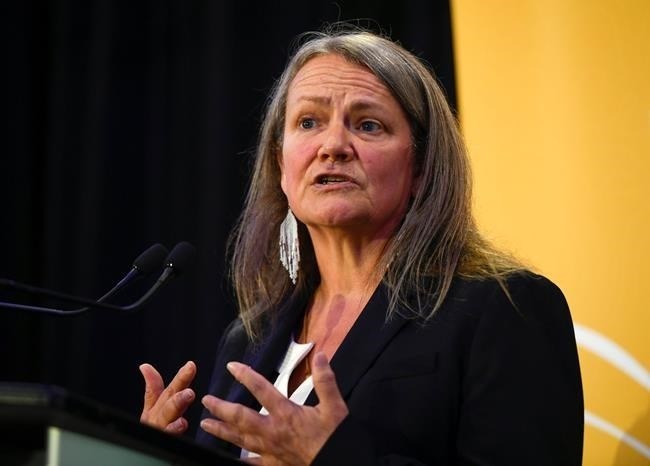
In July, the Senate committee issued an interim report alongside the Independent Special Interlocutor for Missing Children and Unmarked Graves and Burial Sites associated with Indian Residential Schools, Kimberly Murray, that found some governments and churches continue to withhold records about residential schools and associated sites. Murray speaks at a news conference in Ottawa June 8, 2022.
Image Credit: THE CANADIAN PRESS/Justin Tang
November 12, 2023 - 9:00 PM
OTTAWA - A Catholic archdiocese that operated four Indigenous residential schools in Manitoba and Saskatchewan has finally surrendered a long-awaited trove of records that may hold clues about their tragic history.
The Archdiocese of Keewatin-Le Pas gave the documents to the National Centre for Truth and Reconciliation in late October, not long before Archbishop Murray Chatlain's appearance before a key Senate committee.
Word of the disclosure comes as church leaders face persistent accusations — including from Indigenous leaders who testified before the same committee — that they are dragging their heels on releasing records.
In 2021, a staff member found a box of files containing some residential school lists, and the archdiocese agreed to digitize the records in consultation with the national centre, Chatlain testified.
But until Oct. 27, which is when the National Centre for Truth and Reconciliation says the records were handed over, copies had been shared only with a local historical society — and are likely the last of the records the archdiocese has to release, he added.
"Maybe there's a little surprise, but we are absolutely not holding anything back," Chatlain said. "But, for sure, the vast majority is there — everything we know of."
The Senate committee on Indigenous Peoples has been investigating why some organizations aren't releasing records sooner. Asked by Sen. Scott Tannas if it will take another two years should more be uncovered, Chatlain responded: "No."
A report from Kimberly Murray, Ottawa's special interlocutor for missing children and unmarked graves, said this summer that some governments and churches continue to withhold records about residential schools and associated sites.
Senators have been hearing from experts and pressing religious leaders on why that is the case, and why some residential school staff members who are still alive haven't been made available to share details about their experiences.
An estimated 150,000 First Nations, Inuit and Métis children were forced to attend residential schools. More than 60 per cent of the schools were run by the Catholic Church.
The Truth and Reconciliation Commission, which was formed through the settlement agreement between survivors and the federal government, documented and studied the legacy of residential schools. The commission found physical and sexual abuse, cultural destruction, poor education, malnutrition and widespread illness.
The discovery of possible unmarked graves at former residential school sites in recent years, as well as Pope Francis's dramatic apology last year to Indigenous Peoples, have put the schools, their history and their oversight under fresh scrutiny.
Chatlain said his diocese is looking at developing a memorandum of agreement with the national centre to access sacramental records and other areas of their archives that may be helpful.
Velichor Abaranam Jerome, a general archivist of the General House in Rome, also testified Tuesday. He described a visit members of the centre made to Rome to view their archives, and their efforts to get those documents released.
But last month, the centre's head archivist testified that records of about a dozen Oblate priests convicted of crimes against children in residential schools weren't made available to copy, citing privacy policies regarding personnel records.
Jerome said he was unaware of any problems in copying documents, saying he didn't know if there are any issues outside his jurisdiction.
Indigenous Peoples have repeatedly told the committee it is nearly impossible to access Catholic Church records surrounding residential schools.
Last month, Saskatchewan Treaty Commissioner Mary Musqua-Culbertson described staff having to sign a 21-year non-disclosure agreement to access any records at St. Paul University in Ottawa — only to come up empty-handed.
"Who specifically asks for a 21-year NDA? Who within their organization needs to die within those 21 years that is being protected?" Musqua-Culbertson asked.
"I'm very frank about this because this affects my life, my legacy, my children."
Sen. David Arnot called it "incomprehensible" that some are going to such efforts to keep the records from being released.
Raymond Frogner, the centre's head of archives, said the scope of residential school disclosure needs to be widened beyond religious institutions to include areas like the education, health care and justice system.
Even as head of the archives, Frogner said he has challenges of his own trying to access residential school records.
"I can’t even find the records of my mother who went to Shaftesbury Mission in northern Alberta," Frogner said.
This report by The Canadian Press was first published Nov. 7, 2023.
Note to readers: This is a corrected story. A previous version erroneously reported the Archdiocese of Keewatin-Le Pas had provided a set of records relating to residential schools to the National Centre for Truth and Reconciliation on Monday.
News from © The Canadian Press, 2023